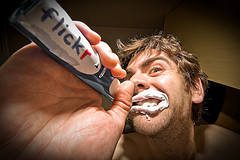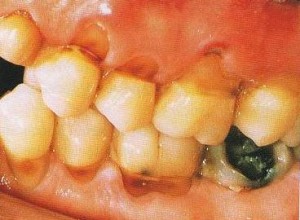Did you know that teeth whitening is the number one requested cosmetic service today and that its popularity continues to soar? A recent survey showed 80% of Americans aged 18 to 49 want whiter teeth, with women leading in this area at 85%. 6 out 10 believe a whiter, brighter smile would boost their self-confidence especially in the 18 to 24 age range. According to the American Academy of cosmetic Dentistry, Americans spent more than $1.4 billion on over-the-counter teeth whitening products last year alone. Continue reading
Tag Archives: sensitive teeth
How to Regrow Gums
Everybody loves to smile, but lately you’ve been hating it because of the state of your teeth and gums. They are a mess, especially your receding gumline. You’re absolutely certain your smile looks more like a jack-o-lantern’s grimace than a genuine expression of warmth. You don’t need to clamp your mouth shut forever, but rather take a stab at a few methods that may help you regrow gums. Gum disease is the leading cause of extensive of gum damage. Feel fortunate that you found out the problem before you developed things like loose and sensitive teeth. If you already have sensitive or loose teeth, don’t waste any more time. Get yourself back to your dentist to get help with your receding gum problem. It’s always helpful to walk in with some knowledge of the receding gum treatments. Continue reading
How Can I Care for My Sensitive Teeth?
 When you experience sensitive teeth, the first consideration should be to determine the cause of the pain since it may be difficult to differentiate between sensitive teeth or dentin hypersensitivity and a variety of other tooth pains and discomforts. Dentin or pulpal pain (caused by a noxious agent, i.e. dental caries) can be intensified by thermal change, sweet, and sour, all of which could elicit a hypersensitivity reaction as well. A differential diagnosis to rule out other conditions must be established before resorting to treatment. Diagnostic aids include history of pain, percussion and palpation tests, inspection of the teeth and surrounding tissues, thermal and electric pulp tests, and radiographic examination. Once other causes for tooth pain have been ruled out, and dentin hypersensitivity has become the established diagnosis, an individualized management strategy with suitable treatment recommendations should be developed to address your specific needs.
When you experience sensitive teeth, the first consideration should be to determine the cause of the pain since it may be difficult to differentiate between sensitive teeth or dentin hypersensitivity and a variety of other tooth pains and discomforts. Dentin or pulpal pain (caused by a noxious agent, i.e. dental caries) can be intensified by thermal change, sweet, and sour, all of which could elicit a hypersensitivity reaction as well. A differential diagnosis to rule out other conditions must be established before resorting to treatment. Diagnostic aids include history of pain, percussion and palpation tests, inspection of the teeth and surrounding tissues, thermal and electric pulp tests, and radiographic examination. Once other causes for tooth pain have been ruled out, and dentin hypersensitivity has become the established diagnosis, an individualized management strategy with suitable treatment recommendations should be developed to address your specific needs.
There are numerous treatment strategies and interventions to manage tooth sensitivity. In addition to pain control, long-term management is most successful when treatment strategies include the elimination or reduction of contributing factors. Sensitive teeth are best managed through self-care, professional care, or a combination of the two. Exposed dentin surfaces that do not elicit pain need only be monitored and treated as needed to reduce tooth decay risk. Continue reading
Oral Health Pt 2: Effects of toothbrushing, dietary sugars and acids

Toothbrushing improves oral health
What affects oral health?
The obvious answer would be oral hygiene care. Importance of tooth brushing cannot be stressed enough and the quality, rather than the quantity matters more. While most people brush two, some even three times a day, the truth is that it does not necessarily prevent you from dental problems such as dental decay or gingivitis especially if you are not brushing appropriately. Having a good tooth brushing technique is crucial to good oral health as being able to remove plaque effectively is directly related to the state of your mouth. In fact, some people with very good tooth brushing technique and reasonable sugar intake are actually able to get away with just brushing once a day without developing any dental problems. The only reason that dentists are advocating their patients to brush twice a day being most people of the population will fail to remove plaque adequately and requires that extra kick to help maintain oral health at good levels. Continue reading
Are You Brushing Your Teeth Away?

© Australian Denture Care Centre
Toothbrush abrasion is a type of dental abrasion which is commonly seen in the mouth. It is most frequently on the junction where the teeth meet the gums (gum line or gum margins) and the root surfaces of teeth.
Toothbrush abrasion is the result of traumatic tooth brushing in a horizontal scrubbing movement rather than a vertical direction and appears as notches worn into the teeth near the gum margins which can be made worse by abrasive dentifrices. Changes can be detected anywhere in the mouth, although the upper teeth are usually more involved than the lower teeth. Continue reading